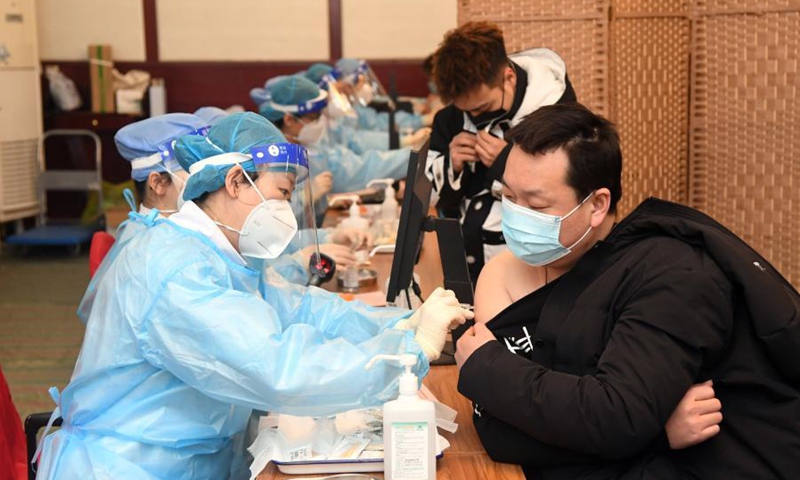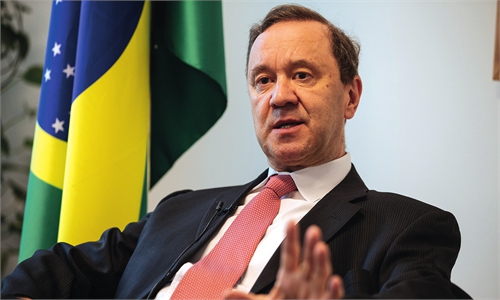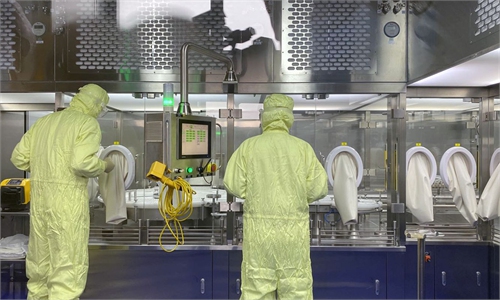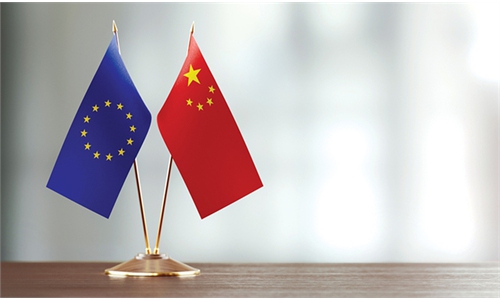
A medical worker inoculates a recipient with the second dose of COVID-19 vaccine at a temporary vaccination site in Haidian District of Beijing, capital of China. Photo: Xinhua
Recipients can accept a second COVID-19 shot developed using the same technique but by a different producer under special conditions, a Chinese health official said on Thursday, vowing to increase supply to ensure success of the injection of the second shot amid reports of vaccine shortage in some places.
In response to the difficulty in receiving the second shots reported by some people, Wang Bin, an official from China's National Health Commission (NHC), said at a press conference on Thursday that supply will be enhanced to meet demand and priority would be given to people waiting for their second shot.
The second shot should be administered within 3-8 weeks after the first injection. On some special conditions, people can accept a second shot from a different producer but developed using the same technique, Wang noted.
Nearly 250 million shots had been administered in China as of Wednesday, according to the NHC, surpassing 234.6 million doses administered in the US as of the same day. Vaccines currently being used in China include inactivated vaccines of Sinopharm and Sinovac Biotech, recombinant adenoviral vector vaccine of CanSinoBIO and recombinant subunit vaccine of Anhui Zhifei Longcom Biologic Pharmacy.
According to media reports, in some places people had been given a second shot of a different producer when there was a temporary shortage, the Global Times has learned.
Mixing two different producers' vaccines is acceptable when there is a vaccine shortage. We also hope the method, under an ideal condition, could take advantages of different shots to create a more effective one, Zhuang Shilihe, a Guangzhou-based vaccines expert, told the Global Times on Thursday.
However, due to a lack of studies, Zhuang suggests recipients should try to accept shots from the same producer even though the interval will be prolonged.
Mixing different vaccines - even those made using different techniques - have been conducted or put under clinical trials in some places where they are facing a serious epidemic, such as Brazil and the UK. Research on the method among global authorities and producers is also accelerating to get solid data as soon as possible.
The Global Times learned that BioNTech is conducting research on mixing inoculation to combine the Pfizer/BioNTech mRNA vaccine with China's inactivated or adenovirus vector vaccine to boost efficiency.
Researchers in Hong Kong are also conducting a clinical trial, mixing Pfizer mRNA vaccines with Sinopharm's inactivated vaccine.
Chinese authorities and producers have also been studying how to increase existing vaccines' efficacy by mixing them, Gao Fu, the Director of the Chinese Center of Disease Control, said in an exclusive interview with the Global Times.




